Back to Berlin
[ 3_iii. dinges
- final episode - ]
earlier episodes -->
[ 1. "bo tunty te ...!" ] [ 2.
found tapes ][ 3_i. feelt
] [ 3_ii. reek or ]
july 01, 2007.
Wednesday june 27th's edition of Framework, Patrick McGinley's weekly ResonanceFM emission (running for over five years now!), "consecrated to field recording, and it’s use in composition" took us once again back to the Berlin where in february of this year the second edition of Rinus van Alebeek's das kleine field recording festival took place ... (Ah, but you will know that by now! And if not, just check out some of the earlier episodes of 'Back to Berlin' - links above.)
For the series of guest-curated framework:afield programs
I made 'Back to Berlin - The Master of Germany', a one hour selection
from the material that I field recorded in february on the occasion of the
festival. Most of it in lo-fi mono, with my dictaphone and a lapel microphone;
some of it in stereo, on my minidisc recorder.
[ The archived version of this june 27th edition of Framework:afield
remains available
for download, but that will be only for another couple of weeks. ]
A five hour selection (together with fragments from the tapes
I picked up in the streets of Berlin, some isolated auddities
and extracts of a synth recording I made when I
visited Berlin way back in 1984) is streaming 24/7 at Raudio:
it is the eleventh edition of Raudio's main stream, entitled 'Back to
Berlin', like this series of entries. [ click
and play Raudio #11 ]
This is my 'Berlin Soundscape'.
Since it started, end of march, the stream has been steadily evolving, until last weekend, when I added the final bunch of selections from my Berlin recordings.
The little gray embedded flash object to the right allows you to listen to the very last one of the 479 files that I added ... Click the little black circle ... It will take you to Monty, in the Lenbachstraße in Berlin, on the thursday evening of february 8th, the Day of the Sound Story Telling. Somewhere halfway his performance Jeff Gburek's laptop had crashed. While Jeff is starting up his machine again, Rinus announced a 'commercial break', and began scratching around Monty with his dictaphone ...
Before taking the train from Amsterdam to Berlin, I went by bus from Paris to Amsterdam. That long ride I spent listening to the cassettes that I recently recorded, and to a bunch of micro-cassettes that I had bought on the Montreuil flea market the other weekend, looking for material that might be of use in my Monty sound story telling performance.
All the days of the second edition of das kleine had a theme, and almost all themes corresponded to a specific kind of story: that of an imaginary homecoming, that of a travelogue, that of a collection of archived sounds, one captured as a Berlin soundscape... The thursday in Monty, though, asked for a 'sound story' tout court ...
.That's an awful lot of freedom.
A 'sound story' may be anything somewhere on the large scale ranging from pure text: that which says *all* about *nothing*; to pure music, pure sound, which says *nothing* about *all*.
The reading (loud or in silence) of Xavier de Maistre's Expédition nocturne autour de ma chambre, Kurt Schwitters' Ursonate, James Joyce's Finnegans Wake, the playing of Ludwig van Beethoven's Große Fuge, Ornette Coleman's Free Jazz, the soundtrack of Tarkovski's The Sacrifice, Bob Dylan's The Times They Are A Changin', the two Diktat improvisations that we recorded this tuesday evening, Iannis Xenakis' Concret PH, Karlheinz Stockhausen's Aries, sun O)))'s A Shaving of the Horn That Speared You, of Marcy Playground's Sex and Candy ... text, sound, music, or any of the multitude of their possible combinations, they all develop over time, and it is in time that we perceive them; it is in time that they mooove: a temporal unfolding of intricate relations, signifiers and references that inter-act with-on the perceiver's expectations and emotions. ( * )
.That's a story.
The story that came with one of the flea market tapes that I listened to in the bus from Paris to Amsterdam had me mesmerized. The recording on it is not very long, less than fifteen minutes. It starts with a woman arguing on the telephone with a man on the other side of the line, amidst of a lot of cracklings and electromagnetic interference which in rhythm and agitation seem to follow her own. The man then hangs up on her.
This is not a tape from a telephone answering machine though. It must have been recorded by the woman holding the dictaphone's microphone near the telephone. The woman's name is Marie-Laure. She lives in Paris, has a bird (which in parts of the recordings is squeaking along) and three children, together with Christophe, who is 'the other' in the telephone conversations that she recorded.
In between the telephone fights with Christophe, Marie-Laure records monologues on her dictaphone in which in a hoarse whispering voice - probably while lying down on a bed or a sofa - she reflects upon her life, her children and her ending relation with Christophe.
And while I was silently staring out of its windows, the bus was speeding along the french highway in northern direction with the low rumble of the bus's engine and the buzzing sound of its wheels rolling along below me acting as sort of a sonic canvas on which the sounds of the cassette in my little earphones painted the story of Christophe and Marie-Laure.
It's an everyday story, almost trite, of a relationship that has shipwrecked. But recounted through nothing but the sounds on this lo-fi field recording the story becomes abstract in its anonymity: the protagonists are mere names and voices; as we do not know them, they have no hi-story. They are somehow universal. Neither Christophe nor Marie-Laure for me does exist outside the recording; anything I read into it, into them, any interpretation, will be necessarily mine; it is rooted in my proper experience, in my expectations and emotions, when, in that 'intricate play of references and signifiers' I add-on to the abstract and 'complete' the story into one among many possible shapes, formed by each of its individual 'perceptions'.
.That's music.
And that is why I decided that this tape should play a central role in my 'sound story telling' contribution in Berlin. It still took a while, though, before I realized that actually I needed hardly anything other than this tape. Eventually I presented it as I found it, not in a performance, but rather as an installation set up so as to enable the audience to experience the tape much as I did when I first listened to it in the bus from Paris to Amsterdam.
Somewhere near the beginning, confronted with a demand by Marie-Laure, the distorted and faraway voice of Christophe in the telephone exclaims: "Mais je ne vais pas faire 250 kilomètres pour tes beaux yeux!" ( * ) ...
It is why I call it: "Pour tes beaux yeux".
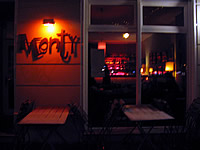 |
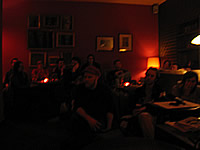 |
Monty proved a great spot for its premiere: small, intimate, and with a slight bordello touch because of its lighting and decoration. Monty's sound system consisted in four small speakers, suspended in four corners. But I did not want to play the tape over that installation, I merely used it to amplify the hiss of an empty cassette tape - like the sound of the wheels of the bus rolling along the highway - and the low buzz of the walkman playing back the empty tape - representing the sound of the bus's engine. These sounds produced by an old walkman playing back an empty cassette tape form the canvas for the story. My dictaphone with Marie-Laure's tape in it I put on a bar stool. And I played it back 'acoustically', through the dictaphone's built in loudspeaker.
I rarely have had a more attentive audience than that thursday evening in Monty ... which is all the more remarkable, as there was hardly any one present that understood the french words that were being spoken.
I did "Pour tes beaux yeux" again on march 17th, 2007, when I was a guest in Cédric Angl's weekly 'La pointe de l'iceberg' emission, on RGB radio in the suburb of Cergy, to the north-west of Paris. When I listened back to its recording, I dearly missed the set-up and the ambiance of Monty which in hindsight were an important part of the piece ... Ah, but I will find another 'red bar' for it sometime here or there!
I continued recording all along pretty much of my waking days in Berlin, but I did not have much time to re-consider these recordings, to listen and to select. So I did have something of a dilemma with respect to my planned contribution to the final official evening of the second edition of das kleine, the evening of the Berlin Soundscapes, that took place on sunday february 11th, in the Electronic Church, in the Greifswalderstraße in Prenzlauer Berg, as I simply felt it impossible to keep up with the Berlin recordings that I was making.
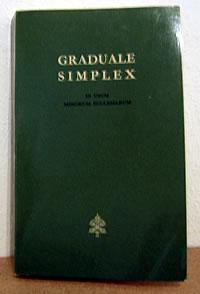 It
is thus that it occurred to me that instead of using my Berlin recordings
as material for an oblique 'Soundscape' improvisation, I'd better make this
impossible "Keeping Up" the theme of my performance in the Electronic
Church. So on sunday afternoon I went out walking in the area bounded by
the Wülischstraße, the Modersohnstraße, Ostkreuz and the S-bahn track. I
recorded that walk. I recorded it on my MD recorder. And I recorded it,
at the same time, on my dictaphone. "Keeping Up" is the simultaneous
playback of these two recordings - that because of the very different recording
devices they were made on each come with a pretty distinct sonic texture
that makes it possible to distinguish between them - while I use the vari-speed
button of the dictaphone to keep them synchronized, as good as possible.
"Keeping Up" proved a fun sound game, of which you may have heard
an extract in the second of the two das kleine emissions that RadioINCORRECT's
Tobias Luther made for Framework (broadcast on march 7th, 2007). It obviously
also is a simple recipe that you may follow and use with a 'double recording'
of your own choice.
It
is thus that it occurred to me that instead of using my Berlin recordings
as material for an oblique 'Soundscape' improvisation, I'd better make this
impossible "Keeping Up" the theme of my performance in the Electronic
Church. So on sunday afternoon I went out walking in the area bounded by
the Wülischstraße, the Modersohnstraße, Ostkreuz and the S-bahn track. I
recorded that walk. I recorded it on my MD recorder. And I recorded it,
at the same time, on my dictaphone. "Keeping Up" is the simultaneous
playback of these two recordings - that because of the very different recording
devices they were made on each come with a pretty distinct sonic texture
that makes it possible to distinguish between them - while I use the vari-speed
button of the dictaphone to keep them synchronized, as good as possible.
"Keeping Up" proved a fun sound game, of which you may have heard
an extract in the second of the two das kleine emissions that RadioINCORRECT's
Tobias Luther made for Framework (broadcast on march 7th, 2007). It obviously
also is a simple recipe that you may follow and use with a 'double recording'
of your own choice.
The third edition of das kleine will again take place in Berlin,
during most of the month of august, and Rinus' preparations for the event
are well on its way. A different set-up, different artists, new locations...
You may get updates on the developments at daskleinefieldrecordingsfestival.org.
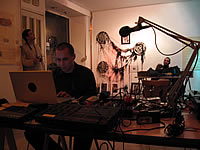
This new edition promises to become as least as exciting and interesting
as the second edition of das kleine, which on the evening of february
11th in the Electronic Church almost ended, with Kate Donovan, Marcel Türkowsky
and myself doing a short free-style improvisational dance with scratching
dictaphones. It ended there almost. For it only really ended the
day after, on monday february 12th, with a secret concert in Kunstraum Takt.
But that of course, was a secret ... (click the picture to enlarge) ...
extracts of the secret recording made that evening found their way into
'Back to Berlin'.
notes __ ::
(*) Leonard Meyer's study in musical semantics, from
1956, Emotion and Meaning in Music, remains an interesting read
and a fine scholarly analysis of 'music as being essentially in-time' and
'listening as a process' . (Here are some
online lecture notes by David Huron on Meyer's work.) [ ^ ]
(**) "I will not drive 250 miles for your beautiful eyes!" [
^ ]
comments for « Back to Berlin, 3_iii » ::
|
Comments are disabled |
The Ministry of Silly Crackles
june 23, 2007.
When asked in a recent interview : "Do
you like contemporary music?", Christine Albanel - the new french minister of culture,
member of the government led by François Fillon -
answered without the slightest hesitation.
"No!" she said.
That, boys and girls, was the right answer ...
To praise minister Albanel's frankness, the Commando Antibruit (Antinoise Brigade) decided to go and bring her a serenade, on the day of the Fête de la Musique, thursday june 21st.
At 7 pm we - Marie Borrel, FlexRex, Rébus, HarS - met in the very heart of Paris, at the exit of metro station Palais Royal on the place Colette, crowned by Othoniel's kiosque des noctambules (kiosk of the night-walkers). From there we walked up the Rue Saint-Honoré, to the entrance of the ministry of culture and communication (at number 182), where we joined up with a fifth commando: Raphael Raccuia.
We pulled our crackle boxes and started our noisy business, right on the doorstep of Christine's ministry, which for some thirty, forty minutes or so became the Ministry of Silly Crackles ...
The short YouTube impression above was shot and put online by Rébus, who also took some photographs ... (click the image to enlarge).
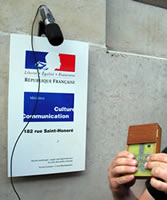 Funny enough no-one asked us any questions ...
Funny enough no-one asked us any questions ...
Regularly passers-by halted for a while and watched us ... And all the time
during our performance civil servants continued to leave the building, as
their working day had come to an end. Most of them, with just an occasional
exception, brought a benevolent smile to their lips upon noticing us and
our squeaking and crackling, but then just continued their way. Some of
them even halted a couple of meters further, and watched us from a distance.
But no questions were asked ...
Only once a security guard stepped out, and warned us that we should not
block the entrance, but leave a passage free for people to step in and out.
No further questions asked.
Contemporary music? "A heap of Silly Crackles ..."
[ "Je n'aime pas la musique contemporaine" is a short montage
of the MD recording of our stay on the ministry's doorstep. It is this
soundblog edition's podcast ![]() .
]
.
]
[ added july 4th, 2007 - "Christine Albanel n'aime pas l'art contemporain ?" (french article, with reader comments, about this CAB action on the website of the french free daily 20minutes). ]
[ earlier related SB-entry : CAB @ Areva (2006) ]
comments for « Ministry of Silly Crackles » ::
|
Comments are disabled |